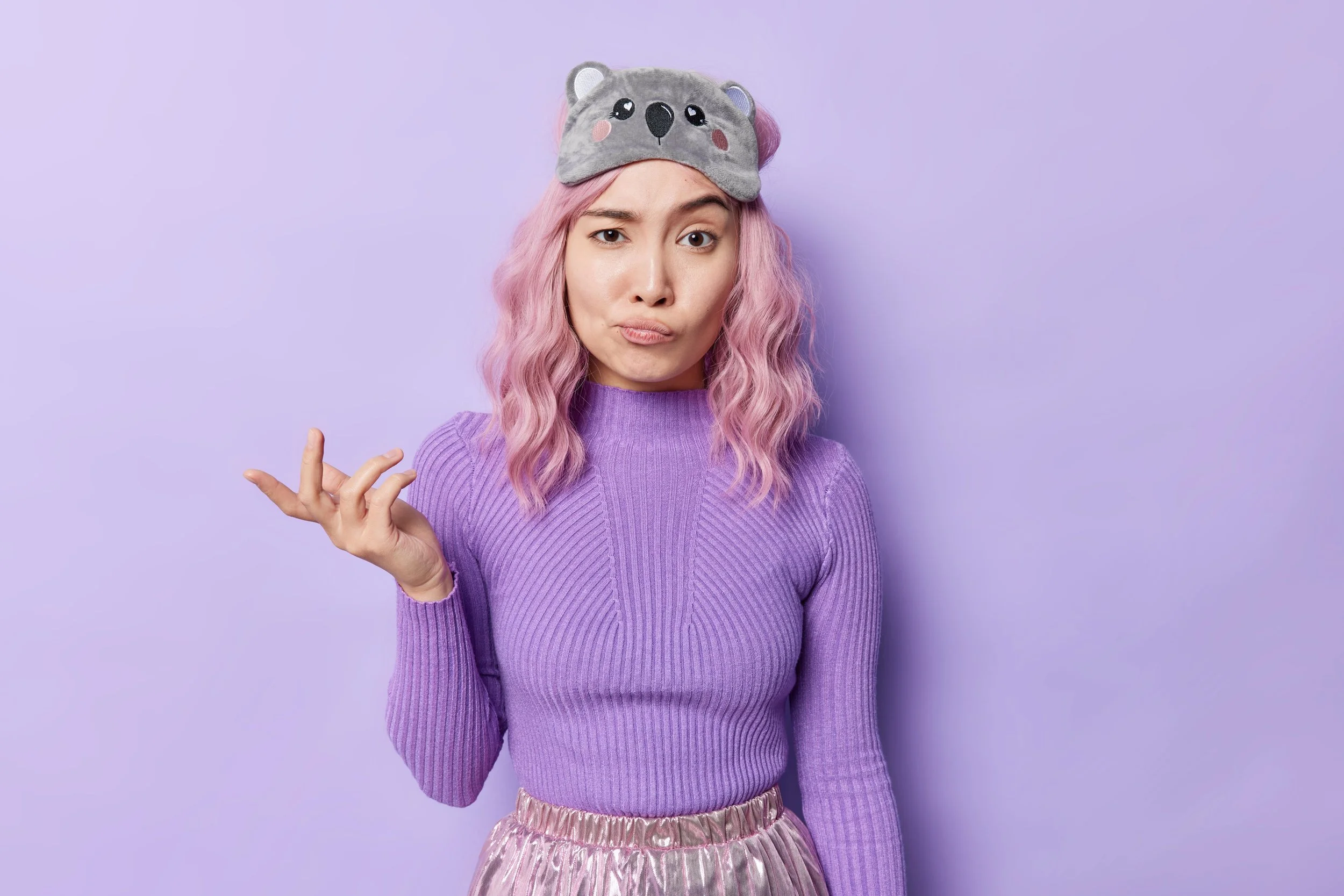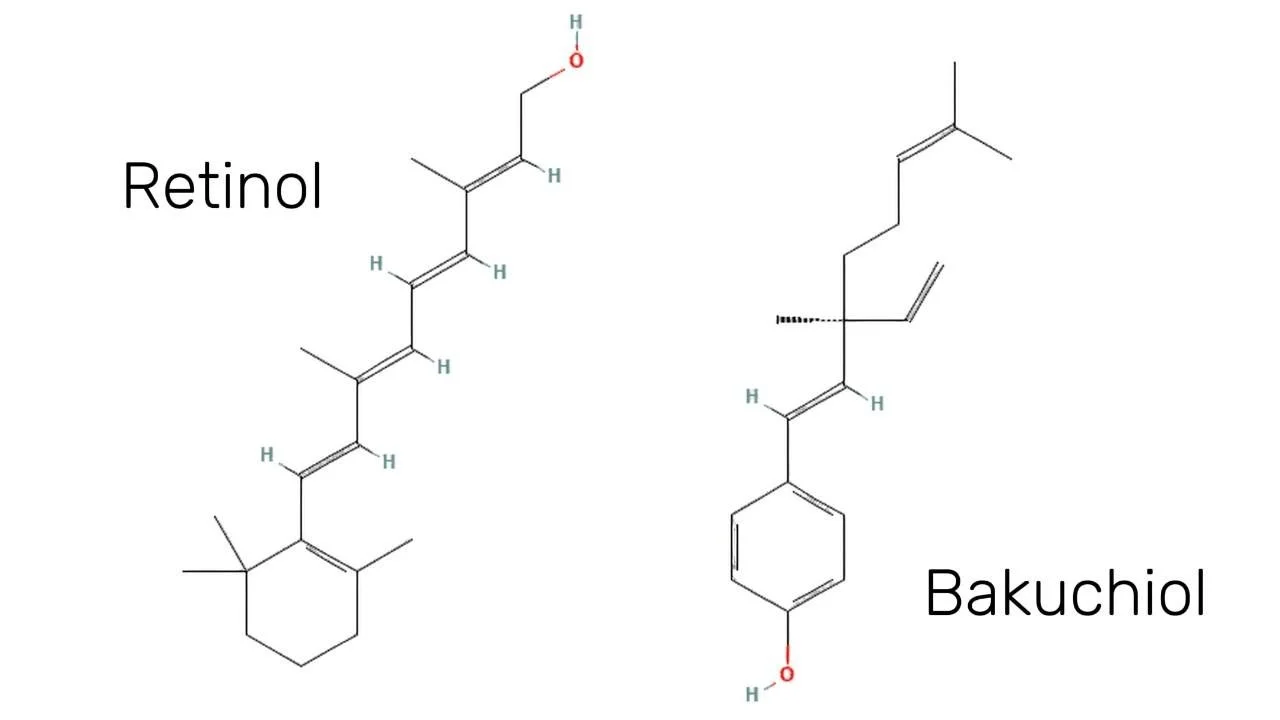Retinol vs. Bakuchiol: A Science-Backed Comparison of Anti-Aging All-Stars
Written and fact-checked by: Mollie Kelly Tufman, PhD (Biochemistry)
Updated November 2025
Disclosure: This post contains affiliate links. As an Amazon Associate, I earn from qualifying purchases—at no extra cost to you. I only recommend products I truly believe in.
You’ve probably heard the hype: retinol is the gold-standard anti-aging ingredient, and bakuchiol is the “natural dupe” popping up in every purple, plant-based serum on your feed.
So… which one actually works? And which one makes sense for your skin, your tolerance level, and your life stage (hi, pregnancy and rosacea)?
If you’ve ever stood in your bathroom holding two serums and whispering, “Which of you will make me glow without wrecking my barrier?”—this post is for you.
We’ll walk through how retinol and bakuchiol work, what the clinical studies actually show, who each one is best for, and how to use them without turning your face into a peeling science experiment.
Retinol vs. Bakuchiol in 30 Seconds
Retinol = vitamin A derivative with decades of data. Increases collagen, speeds up cell turnover, smooths fine lines, fades dark spots, treats acne—but can be irritating and is not recommended in pregnancy.
Bakuchiol = plant-derived compound that affects many of the same gene pathways as retinol without binding retinoid receptors. Early trials show retinol-like improvement in wrinkles and pigmentation with far less irritation.
- If your skin is hardy and you want maximum anti-aging + acne benefits: classic retinol usually wins.
- If your skin is reactive, rosacea-prone, or you’re avoiding vitamin A: bakuchiol is a strong, gentler contender.
🔬 What Are Retinol and Bakuchiol, Anyway?
🟡 Retinol: The Proven Powerhouse
Retinol is a form of vitamin A that your skin enzymes convert into its “active” form (retinoic acid). That active form latches onto receptors in your skin cells and basically tells them to behave like younger, more efficient versions of themselves. Those signals help your skin:
- Make more collagen and elastin (your skin’s support proteins)
- Speed up how quickly old cells are shed and replaced (cell turnover)
- Even out how pigment and keratin are distributed
- Reduce how sticky dead skin cells are in pores (fewer clogs)
Clinically, that translates into visible improvements in:
- Fine lines and wrinkles
- Rough texture and enlarged pores
- Blotchy pigmentation and sun damage
- Acne and post-acne marks
🟣 Bakuchiol: The Plant-Based Contender
Bakuchiol (buh-KOO-chee-all) is a plant-derived compound extracted from the seeds and leaves of Psoralea corylifolia (babchi). It doesn’t act as a true retinoid, but gene-expression studies show it switches on many of the same collagen- and elastin-supporting pathways as retinol, while dialing down some of the irritation-linked ones (Chaudhuri & Bojanowski 2014).
- Reduces wrinkle depth and surface roughness
- Improves pigmentation and overall tone
- Supports firmness and elasticity
- Shows very low rates of dryness, stinging, or peeling in trials
Important: bakuchiol is not a retinoid and doesn’t have the same decades of data behind it. The existing studies are encouraging but still smaller and shorter-term than classic retinol research.
🔬 Where Retinol and Bakuchiol Differ
| Function | Retinol | Bakuchiol |
|---|---|---|
| Boosts collagen & elasticity | ✅ Strongly supported by decades of studies | ⚠️ Promising, fewer and shorter studies so far |
| Speeds up cell turnover | ✅ Direct retinoid receptor activation | ⚠️ Indirect effects via gene pathways; likely gentler |
| Treats acne & clogged pores | ✅ Well-established for acne | ⚠️ Early, limited data |
| Fades dark spots | ✅ Strong clinical data | ✅ Comparable improvement in some trials |
| Improves fine lines & texture | ✅ Consistently shown | ✅ Matches retinol in key trials |
| Reverses photoaging (sun damage) | ✅ Well-documented | ⚠️ Supportive, but still emerging |
| Irritation risk | ⚠️ High, especially early on | ✅ Low; generally very well tolerated |
| Suitable in pregnancy | ❌ Not recommended | ✅ Often used as a vitamin-A-free alternative (check with your doctor) |
| Time to visible results | ⏱️ ~4–12 weeks | ⏱️ ~6–12 weeks |
🧪 What the Research Actually Shows
Three peer-reviewed studies support bakuchiol’s benefits (Chaudhuri & Bojanowski 2014; Dhaliwal et al. 2019; Bacqueville et al. 2020):
1. 2014 Gene Expression Study
A lab study by Chaudhuri & Bojanowski (2014) comparing bakuchiol and retinol found that both triggered similar gene expression patterns involved in collagen production and skin structure, even though bakuchiol doesn’t activate retinoid receptors.
Translation: bakuchiol appears to send many of the same “build collagen, smooth texture” signals as retinol, without acting as a true retinoid.
2. 2019 Clinical Trial
A head-to-head study published in the British Journal of Dermatology found that bakuchiol and retinol both significantly improved fine lines and pigmentation after 12 weeks—but bakuchiol caused less dryness and irritation (Dhaliwal et al. 2019).
⚠️ Note: While the data analysis was valid, the before-and-after images published in the study appear digitally altered. So, I pay more attention to the statistical outcomes (which look solid) than the published photos, and I interpret the results as “comparable improvement to retinol over 12 weeks with less irritation,” not “magic plant retinol replacement.”
3. Newer bakuchiol serum clinical trial
In a more recent clinical trial, a serum combining bakuchiol with Vanilla tahitensis extract was applied twice daily for about 8 weeks on naturally aged skin (Bacqueville et al. 2020).
- Skin firmness and “lift” (less visible sagging)
- Wrinkle depth and overall skin deformation
- Radiance and overall brightness
The serum was also very well tolerated, with good safety and high satisfaction scores, which fits the overall pattern of bakuchiol studies so far: steady, measurable gains with minimal irritation.
These newer studies are small but consistent: bakuchiol improves multiple aging markers with very few reported side effects, which is exactly what you want if your skin freaks out at traditional retinoids (Chaudhuri & Bojanowski 2014; Dhaliwal et al. 2019; Bacqueville et al. 2020).
Separately, a clinically controlled study comparing 0.3% and 0.5% cosmetic retinol serums over 12 weeks found that both concentrations improved wrinkles and skin texture, with the higher strength giving slightly stronger results but also more irritation (Zasada et al. 2020).
🧴 Product Recommendations
⭐ Best Retinol Products
-
CeraVe Resurfacing Retinol Serum — a gentle, encapsulated retinol designed for post-acne marks, texture, and pores, buffered with niacinamide and ceramides.
👉 Check price on Amazon -
The Ordinary Retinol 0.5% in Squalane — a medium-strength retinol for already-acclimated skin, in a simple squalane base that helps reduce dryness.
👉 Check price on Amazon -
Paula’s Choice Clinical 1% Retinol Treatment — a high-strength treatment for experienced retinoid users targeting deeper lines and pronounced sun damage.
👉 Check price on Amazon
🌿 Best Bakuchiol Products
-
Herbivore Bakuchiol Retinol Alternative Serum — a hydrating, plant-based serum that leans into bakuchiol’s gentle “retinol-like” benefits for fine lines and early photoaging.
👉 Check price on Amazon -
Beekman 1802 Dream Booster Bakuchiol Serum — bakuchiol plus nourishing oils (like sunflower and squalane) to support texture, glow, and the appearance of pores while staying friendly to sensitive skin.
👉 Check price on Amazon -
Dr.Jart+ Prejuvenation Firming Bakuchiol Serum — a lightweight serum pairing bakuchiol with peptides and humectants to target firmness, tone, and fine lines together.
👉 Check price on Amazon
🧴 How to Use Each One Safely
Retinol Tips:
- Start 1–2 nights per week for 2–3 weeks, then slowly increase.
- Pea-size for the whole face — more product = more peeling, not faster results.
- Apply to dry skin if you’re sensitive; wait 10–20 minutes after cleansing.
- Moisturize generously (before and/or after) to buffer irritation.
- Skip during pregnancy and breastfeeding — topical retinoids aren’t recommended.
- Use SPF every morning — sun damage will absolutely cancel your progress.
Bakuchiol Tips:
- Use once or twice daily — most trials used AM + PM application.
- Layer with antioxidants like vitamin C and niacinamide; they play well together.
- Pair with SPF even though bakuchiol itself isn’t photosensitizing; UV still ages skin.
- Give it 8–12 weeks before judging results, just like retinol.
- Pregnancy/breastfeeding: often used in vitamin-A-free routines—still worth checking with your OB or derm.
❌ Common Mistakes to Avoid
Too much retinol, too soon → irritation
No SPF → sun damage cancels your progress
Expecting overnight miracles → both need 8–12 weeks
Using too many actives together → overwhelmed skin barrier
Assuming bakuchiol is identical to retinol → similar, not the same
Can You Use Retinol and Bakuchiol Together?
You can use them in the same overall routine, but most people don’t need to. More actives doesn’t automatically mean better results.
- Use retinol 2–3 nights per week if you tolerate it.
- Use bakuchiol on some non-retinol nights or in the morning for extra support.
Avoid stacking strong actives on the same night early on. The goal is steady, tolerable collagen stimulation—not seeing how many serums your barrier can survive.
🙋♀️ FAQs
Which is better for acne?
Retinol. It’s been thoroughly studied for unclogging pores and treating breakouts. Bakuchiol’s acne benefits are promising but not yet conclusive.
Which works faster?
Retinol tends to work a bit faster—but bakuchiol catches up over time and is far less irritating.
Is bakuchiol pregnancy-safe?
Generally yes, but always consult with your doctor. It’s a popular choice for pregnancy-safe skincare routines.
Final Takeaway
Retinol is still the heavyweight champion for anti-aging and acne: decades of data show it smooths wrinkles, clears pores, and softens sun damage—if your skin can tolerate the adjustment phase.
Bakuchiol is the gentler contender: it delivers retinol-like improvements in wrinkles and pigmentation in early trials, with far less irritation and no vitamin A. That makes it especially appealing for sensitive, reactive, or pregnancy-adjacent routines.
Bottom line: pick the option that fits your skin type, tolerance, and life stage—and then stick with it consistently for at least 8–12 weeks, under the protection of a daily broad-spectrum SPF. That’s where the real, science-backed magic happens.
Want to Dig Deeper?
If you’re building the rest of your routine around that choice, this step-by-step anti-aging routine shows what to use AM vs. PM.
Prefer to alternate actives during the week? Here’s a science-based take on skin cycling to minimize irritation.
To prevent product conflicts on retinoid nights, use this pairing guide for what to layer—and what to avoid.
📚 References
Chaudhuri RK, Bojanowski K. Bakuchiol: a retinol-like functional compound revealed by gene expression profiling and clinically proven to have anti-aging effects. Int J Cosmet Sci. 2014 Jun;36(3):221-30. PubMed
Dhaliwal S, Rybak I, Ellis SR, Notay M, Trivedi M, Burney W, Vaughn AR, Nguyen M, Reiter P, Bosanac S, Yan H, Foolad N, Sivamani RK. Prospective, randomized, double-blind assessment of topical bakuchiol and retinol for facial photoageing. Br J Dermatol. 2019 Feb;180(2):289-296. PubMed
Bacqueville D, Maret A, Noizet M, Duprat L, Coutanceau C, Georgescu V, Bessou-Touya S, Duplan H. Efficacy of a Dermocosmetic Serum Combining Bakuchiol and Vanilla Tahitensis Extract to Prevent Skin Photoaging in vitro and to Improve Clinical Outcomes for Naturally Aged Skin. Clin Cosmet Investig Dermatol. 2020 May 13;13:359-370. PubMed
Zasada M, Budzisz E, Erkiert-Polguj A. A Clinical Anti-Ageing Comparative Study of 0.3 and 0.5% Retinol Serums: A Clinically Controlled Trial. Skin Pharmacol Physiol. 2020;33(2):102-116. PubMed



